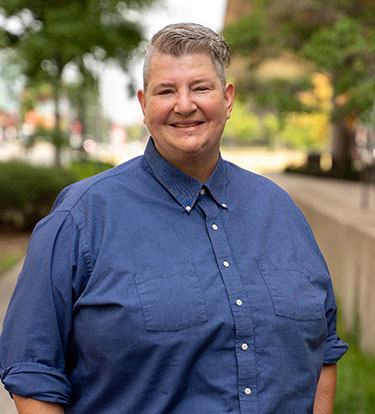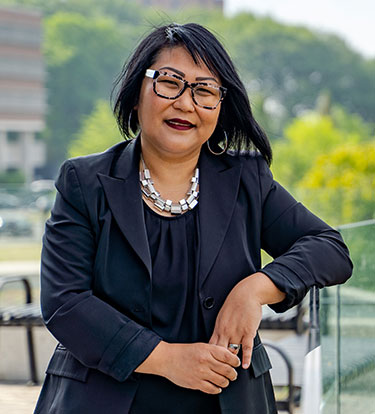Strategic Directions: Teaching & Learning
Quick Links
York University will cultivate inclusive teaching and learning environments that nurture multiple and intersectional ways of knowing, including the incorporation of DEDI principles in curriculum and programs.
Gin Marshall
PhD Student, Social Work, York University
The teaching and learning environment, and experiences in that environment, encompass a wide range of activities including the design of curriculum, experiences accessing teaching and learning in a classroom (physical or virtual), supporting academic activities (such as lab environments, tutoring programs), degree or program design, design and implementation of learning assessments, addressing barriers to success in specific roles related to teaching and learning and the array of supports associated with these activities (e.g. learning management systems, accommodations etc.).
Consistent with the UAP, decolonizing curriculum and classrooms requires that the University acknowledges the history of colonialism and the ways it impacts teaching and learning at the University. This involves disrupting the Eurocentric canons of thought and engages with issues of power, hierarchy, equity, tracing the origins of ideas etc. To reframe the curriculum, it is important to integrate research and resources authored by a diversity of scholars, including Indigenous, Black, racialized, 2SLGBTQIA+, persons with disabilities and equity-deserving scholars. Decolonizing classrooms also calls for utilizing a range of assessment practices to offer students options to demonstrate their learning and providing students with opportunities to engage and participate actively in their own learning through debate and discussion.
Students have indicated that psychological and emotional safety in the classroom is important. Some of the ways in which student safety has been compromised include, but are not limited to, the following: inappropriate/insensitive course content, unmediated debates, faculty and/or instructors singling out students unnecessarily (e.g. inviting Indigenous students to address the class on Indigenous topics thinking they are experts on everything Indigenous) and problematic or derogatory use of language. Further, the ways that certain topics are taught in a classroom can reproduce and perpetuate stereotypes. It is important to pay attention to what is taught and how it is taught. To promote safer learning environments, the University must address this issue through policies, practices, and training for everyone.

Lisa Cole
Director of Programming for the Lassonde School of Engineering’s k2i (kindergarten to industry) academyRecommendations for new university-wide initiatives
- Request that the Senate review those aspects that lie within its purview and those of its committees to incorporate DEDI principles in areas such as new program development, making major modifications to curriculum, cyclical program review recommendations, designing course outline templates etc.
- Request relevant administrative units to consider what actions can be undertaken in support of incorporating DEDI principles in the operationalization of areas related to quality assurance, teaching and learning development and supports, and creation of inclusive experiential learning opportunities.
- Develop and implement an education and prevention campaign on discrimination and harassment in the classroom for all individuals who intersect the teaching and learning environment (e.g. students, faculty, instructors, TAs, lab staff etc.) to be led by the Centre for Human Rights, Equity and Inclusion.
- Develop and implement a four-part web-based course for faculty and instructors on applying the principles of decolonization to classroom praxis to be co-developed by the Teaching Commons and the Associate Vice-President (AVP) Indigenous Initiatives.
- Initiate a symposium on decolonizing practices related to teaching and learning to be co-developed by the Teaching Commons and the AVP Indigenous Initiatives.
Recommendations for continuing initiatives
- That training, education and development opportunities for faculty, instructors, librarians, and academic support persons such as teaching assistants related to DEDI continue to be developed and delivered by the Teaching Commons. Existing training will be communicated more effectively, and training will include new topics such as problem-solving techniques in managing bias and racism in the academy (e.g. managing macro and microaggressions including but not limited to interpersonal violence such as misgendering and mispronouncing names, racial slurs etc., dealing with supervisors who evidence bias and racism, promotion of existing internal mechanisms for conflict resolution and support, how to disrupt whiteness in the academy).
- Continue work to ensure appropriate systems, policies and accommodation guidelines are in place for transgender, non-binary and various gender-identified students, instructors, faculty and staff. This work will continue to engage SexGen (or relevant advisory and advocacy groups as may exist with the creation of the new advisory council on DEDI).
- Continue to create, support and promote accessible and inclusive experiential education opportunities through expansion of supports for engagement of and with equity-deserving student populations and continued collaboration with diverse community partners and organizations.
- Continue to facilitate the Indigenous community book club, collaboratively run by the AVP Indigenous Initiatives and the Teaching Commons, which is open to the entire York community in support of building understanding of Indigenous perspectives on books written by Indigenous authors.
- Continue to support and enhance the Indigenous Teaching and Learning fund out of the Provost’s Office, including increasing awareness of projects and building more champions for decolonizing work in the classroom.
- Continue to implement relevant action items in the Action Plan on Black Inclusion, such as those in the area of Knowledge Creation, among others.
Taking action, making impact
We call on faculties, divisions, units, departments, and individual York community members (including students) to identify and implement actions to:
- Ensure that different histories, global perspectives, ways of knowing are reflected in curriculum including syllabus, content, course delivery and assessment, with a goal to ensure a diversity of scholarship and scholars.
- Engage in a process of decolonizing courses, curriculum, programs of study, support services for students related to teaching and learning etc. This includes undertaking the learning necessary to understand decolonization as a process.
- Encourage faculty and instructors to build flexibility into the course requirements to accommodate diverse student needs. For example: Create opportunities for students to show they understand course content and topics in different ways that are meaningful to them and move beyond traditional assessments and methodologies.
- Provide support to faculty and instructors in becoming well informed on DEDI, culture, history and how inequities manifest, including stereotypes in the classroom. Ensure there are opportunities to develop the capacity and skills to facilitate delivery of such content and classroom discussions.
- Be open to learn about systemic racism, oppression and discrimination (e.g. anti-Black racism, Islamophobia, Antisemitism, ableism, anti-Indigenous racism, anti-Asian racism, homophobia, transphobia) and dominant assumptions about behaviour/professionalism. These include unacknowledged assumptions of what is valued, permitted, stereotypes of communities that are reinforced, and what is being said in the learning environment, that may inadvertently advance a hidden or secondary curriculum.
- Create and promote inclusive experiential education opportunities.
- Utilize universal design in curriculum development and course/training delivery, which may include training and professional development opportunities for instructors, faculty and staff.
Benchmarks
Understanding that benchmarks will need to be established over time, and the mechanisms put in place be able to track University progress, the following benchmarks and/or monitoring systems are recommended:
- Evaluation metrics on training opportunities provided for faculty, instructors and facilitators of training and development sessions for staff to be led by the Teaching Commons, CHREI and Human Resources.
- The University senate considers undertaking a review of program creation and standard course syllabi guidelines and reviews relevant policies and processes related to teaching, including experiential education, and the use of new and emerging technologies for curriculum delivery with a DEDI lens.
- The development and evaluation of an education campaign related to discrimination and harassment in learning environments, to be led by CHREI.
- Monitor key questions on learning and the learning environment, as identified by the Office of Institutional Planning and Analysis (in consultation with key partners) from regular recurring student surveys at the undergraduate and graduate levels, for improvement/progress.
- Review of the Indigenous Teaching and Learning fund for applications, use and impact of the fund by the Provost and Vice-President Academic, and the AVP Indigenous Initiatives.